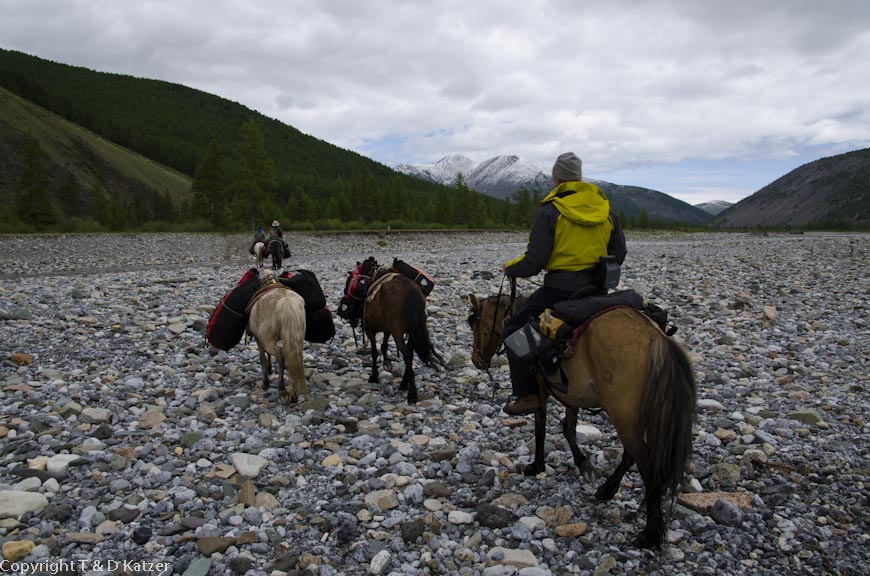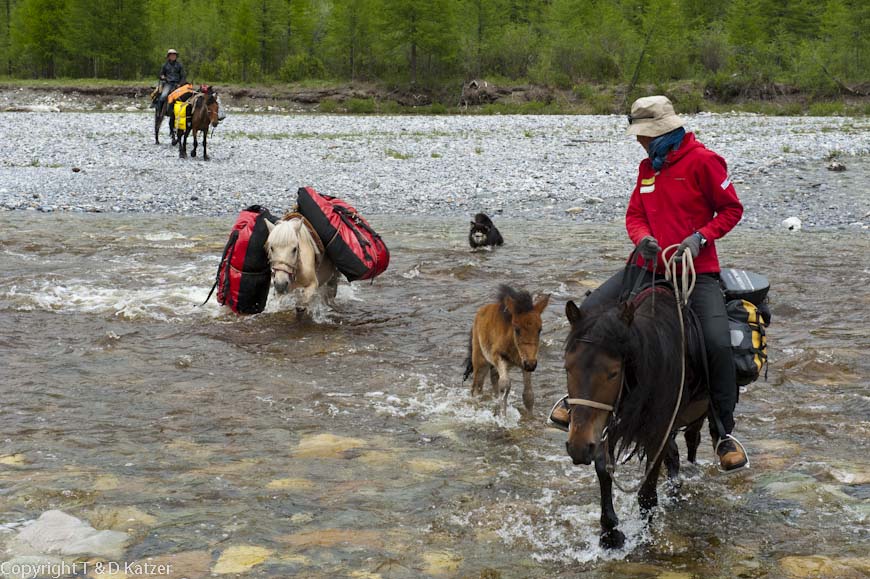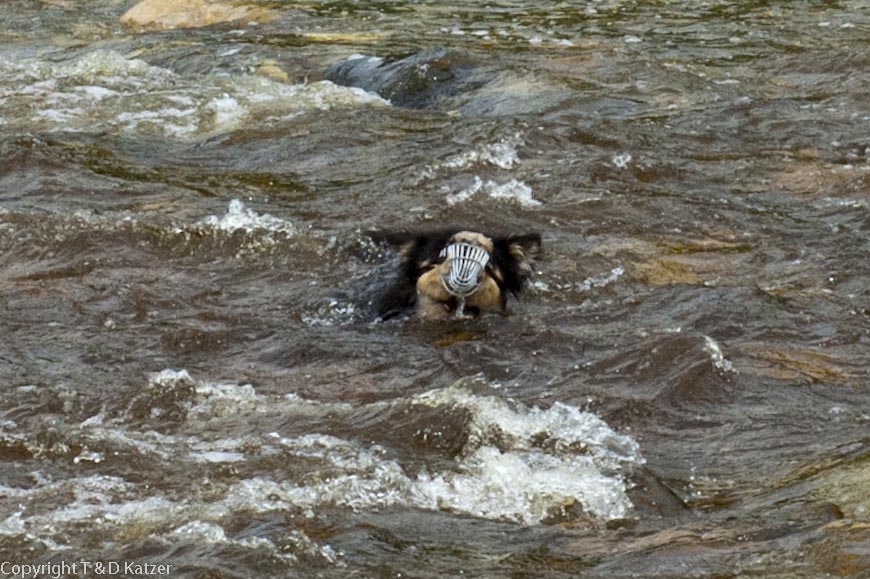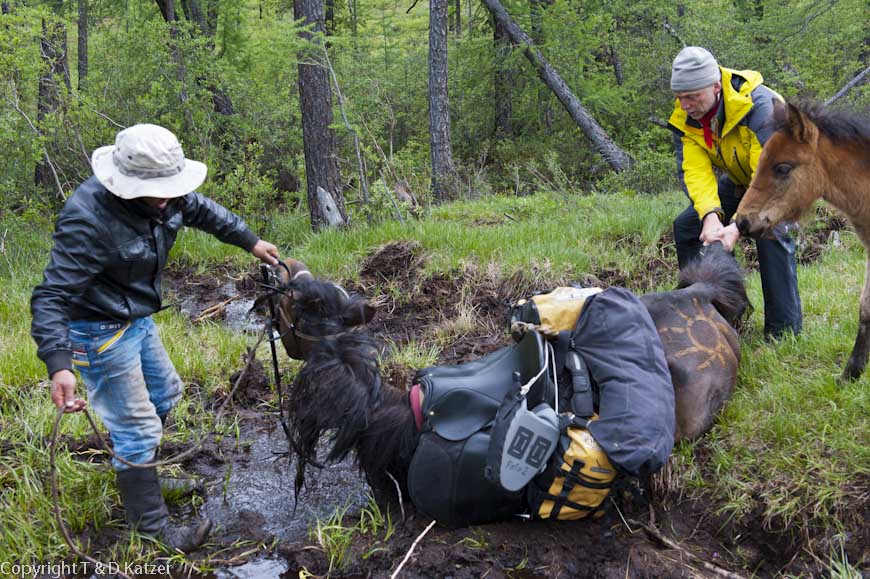
No photos – Naraa sinks into a bog hole
N 51°01'296'' E 100°10'831''
Day: 336
Sunrise:
05:05
Sunset:
21:38
As the crow flies:
14,44
Daily kilometers:
18
Total kilometers:
1516
Soil condition:
Grass
Temperature – Day (maximum):
18 °C
Temperature – day (minimum):
12 °C
Temperature – Night:
minus 6 °C
Latitude:
51°01’296”
Longitude:
100°10’831”
Maximum height:
1843 m above sea level




There is no sign of Rantan this morning either. “He actually left,” says Tanja. “Looks like it,” I reply, still hoping to spot him near the camp.
We have just loaded the equipment onto the horses when Bor suddenly gets a fright and shoots off like an avenging angel gone wild. Stunned, we watch as the expensive solar panel, which is extremely important for reporting, flies through the air and crashes to the ground with all four courier bags. Because the bags contain all the technology, the 20 kilogram car battery and one of the two laptops, this incident could mean the end of further recordings. After a few seconds of shock, I jump off Sar’s back, put the horse’s fetlocks on him and rush to the luggage lying in the meadow. “The solar panel has been hit hard. All four retaining eyes have shredded out of the material,” I say to Tanja, who is standing next to me a few minutes later, panting heavily from her sprint. “And what does that mean?” she asks. “We can no longer attach it anywhere. That means we are no longer able to generate solar energy while riding.” “Which means you can’t generate enough power for the batteries and especially for the laptop,” she adds to my description. “Yes,” I answer sadly. “You’ll think of something,” Tanja tries to encourage me. “I hope the laptop and the chargers haven’t been damaged,” I say as Khurgaa and Bumbayr step up next to me and say, “If we had loaded the bags according to our technique, this wouldn’t have happened. You must never tie the load to the saddle. If a horse goes through and the load starts to slip, it will kick its load until it falls off its back in pieces, as in this case,” they explain to me. I’m tired of saying just one word back. Too tired to explain to them again that he had adopted this loading technique from Bilgee, a very experienced horseman. I also don’t have the nerve at this moment to tell the two of them that I have covered almost 15,000 kilometers with camels, horses, donkeys and elephants in the last 20 years and that I am incredibly annoyed at being lectured to incessantly by a 25 year old and a 15 year old. Of course I am aware that I can also learn from younger people. As a rule, I am also happy to accept this. But in this case, people are just talking garbage. Above all, this also prevents the solar panel from becoming whole again.
“Okay, then we’ll load Bor today with your technology again. But the large duffel bags on Sharga and Tenger will remain unchanged,” I say in a calm, friendly voice. Astonished, I witness how our two Mongolians wrap the finger-thick rope around Bor’s pockets, saddle and entire body. If he goes through, he will break his legs in the rope, strangle himself and turn the equipment strapped to his body into atomic dust. I stand there shaking my head. “Someone should understand the Mongols”, I say, because Bilgee’s technique is absolutely harmless in comparison. “The main thing is that they can assert themselves,” says Tanja, shrugging her shoulders.
As we sit in the saddle again, Tanja discovers Rantan hiding behind a tree, apparently watching us the whole time. “Rantan! Rantan! Come over here. It’s so nice to see you again!” Tanja calls out and throws him a boortsog. Rantan wags his tail and joins our tour group as if nothing had ever happened. We are all relieved to have him back with us. The mood has suddenly changed for the better.
The path is arduous. The rushing water of the river, which is frozen over in winter, winds its way through the narrowing valley like a ravenous snake. Again and again we have to cross their floods. In some places the ford appears impassable. “Will the horses get through?” I ask doubtfully, as I have already experienced how such a strong current has swept away entire horses with their loads and washed them away. Our companions laugh. “Asuudal bisch”, (no problem) say Bumbayr and Khurgaa riding ahead. “Tuya can’t do that, can she?” asks Tanja worriedly. “It doesn’t carry any luggage and is at least twice as big as the dogs. If they manage to swim through it, it’s no problem for Tuya,” I reassure her, hoping I’m not mistaken.
I cautiously follow our horse boys, Sharga and Bor drifting in front of me. In fact, we cross the floods at least 10 times that day without losing a duffel bag or a horse. Mogi and Rantan, on the other hand, are often washed hundreds of meters downstream by the raging mountain waters. But they also master the challenges with flying colors.
As the river crossings demand our full attention, the situation rarely allows us to capture them photographically. At first I can only imagine that Khurgaa and Bumbayr turn their faces away from the camera. But then I realize that there is full awareness and intention behind it. “No photos!”, the two of them shout as I try to take a portrait of them. At first I am too stunned to react and laugh. “No photos!” repeats Khurgaa, lowering his head and pulling his hat down over his face. “What, like no photos?” I ask incredulously. “No photos,” he repeats as if his brain has a crack in the hard disk. “You’re joking, right?” “No, not joking. No photos!” he repeats stubbornly. “Yes, tell me. You’re out of your mind, aren’t you? We’re here on a journey that we’re documenting. That’s our job. That includes photos!” “Not here and not today!” he replies, repeating himself. Still thinking I’ve heard a bad joke, I ignore his statement and continue taking pictures while Khurgaa and his nephew actually turn their faces away from the camera.
Well, we have had many challenges on this expedition, but this one is completely new and as unexpected as a summer downpour. But because the route ahead demands a lot from rider and horse, I postpone the problem until later. Khurgaa and Bumbayr want to set up camp at a supposedly geographically important point in the landscape. However, a glance at my navigation computer tells me that I have only covered 12 kilometers. “We have to keep going,” I decide. Shortly afterwards, we reach a pass at an altitude of almost 2,000 meters. The ground is dangerously boggy. With extreme concentration, we drive our horses to the summit, where we are greeted by an Ovol. We rest only briefly and enjoy the view of Khuvsgul Nuur, which now lies ahead of us, from up here. This is exactly where we left the beautiful lake behind us eight months ago. The forests on the steep mountain slopes were almost completely burnt down at this time. We are amazed at what nature is capable of. Fresh green sprouts everywhere. The once bare, black and desolate-looking trunks of the larches are also sprouting their bright green needles. “Fantastic,” I say and push Sar on.
Khurgaa and Bumbayr are still hardly involved in driving the horses, which is why I take on this job too. Of course I enjoy this task. However, it has been agreed with our two headstrong boys that this is their job so that I can devote myself fully to filming and photography. But we are in a country where the word doesn’t count for too much. So I try not to get angry about it and drive our horses. But the question arises more and more vehemently with every meter that passes as to why we have them with us at all? Why do we pay them at all and, above all, for what? Maybe to finance their summer vacation? It soon seems to me that we are once again jumping from the frying pan into the fire with them. On balance, they are more pleasant than the outlandish Odonbaatar, who we had to dismiss because of his lies and unreliability, but in the meantime the unpleasant actions of the two have become so grotesque that it doesn’t take much to break the camel’s back.
Naraa sinks into a bog hole
We are riding slowly and carefully through the damp, boggy high valley that leans towards the lake when it suddenly happens. Tanja abruptly disappears from my field of vision because Naraa simply collapses beneath her and falls to the side like a felled tree. “Oh God!” I gasp, but see Tanja getting to her feet again. “Have you hurt yourself?” I ask immediately, jumping off the horse. “No, but Naraa is sinking into the mire!” she shouts indignantly. We join forces to try and free the poor animal from the bog-like ground, but without the slightest success. “The camera!” I shout in horror as I notice in the corner of my eye how it, the saddlebags and the banana-shaped bag containing important equipment such as a flashlight, rain gear etc. slide off Naraa’s back into the swamp. “We have to unclip the saddlebags!” yells Tanja. As soon as we have freed Naraa from the burden of her luggage, she disappears into the moor up to her shoulders. “She has to get out of there!” shouts Tanja, fearing for her beloved horse. “I know!” I reply and pull on the mare’s tail while Khurgaa presses both hands against her body to bring her into a sitting position. Meanwhile, little Tuya runs around his mother and makes unusual noises. Perhaps he also senses the seriousness of the situation. Naraa’s legs are grotesquely twisted. “I secretly wonder how we’re ever going to get her out of there with her skin intact? It takes maybe 10 minutes until we manage to heave Naraa into a sitting position with our combined strength. Then we straighten her front legs to give her a chance to stand up on her own. However, every attempt so far has been unsuccessful. While Tanja pulls on the reins, I pull on her tail and Khurgaa pushes against her body with great force, we shout commands to the horse, which is now sinking menacingly. “Let’s go Naraa! Come up! You can do it!!!” The mare, covered in mud and trembling all over, now helps to pull herself out of the deadly trap. “Let’s go! You can do it! Hauruck! Hauruck! Hauruck!”, we shout. The animal rears up again, gives it everything it’s got and manages to put its front legs up. “And now up with your ass!” I continue to yell, tugging on her tail while Khurgaa pushes her forward with his hands and Tanja pulls on the reins. And suddenly, in a collective rebellion, we bring Naraa to her feet with a smacking sound. Exhaling with relief, we drag her out of the treacherous bog hole. Tanja immediately leads her a few meters further onto safe ground. Then we load the dirty saddlebags onto their backs. “I’ll walk the rest of the way,” says Tanja, determined not to put her tired horse through any more today.
Just a few hundred meters further on we reach a clearing with lush grass. “We’ll stay here for the night,” I decide. As soon as our tents are up, Khurgaa asks me if I can charge the battery of his cell phone. “Too little electricity. Maybe tomorrow,” I reply in a friendly manner. “Okay, but tomorrow you can charge the battery?” “Maybe. I have to try to repair the solar panel first. Then I need power for the laptops and the camera batteries. When they’re full, I’ll charge your cell phone.” “I want to call my parents tomorrow. Tomorrow you have to charge my cell phone,” he asks demanding. “Will we have cell phone reception tomorrow?” I ask incredulously because we are still 80 kilometers away from Khatgal. “There is a point on the lake where you have reception,” he promises.
“I don’t believe him. He probably just wants to listen to music,” I say to Tanja shortly afterwards. “You mean he uses the charged battery for his mp3 player?” “I’m sure he does. The boys are crazy about music. Since the cell phone battery also fits in the music player, I assume that’s what it’s for and not for making calls. He could also call with our cell phone. But we’ll see,” I say.
Before we retire to our tents to rest after the exhausting day, I talk to our companions about the photography problem. I explain how important it is for us to take pictures. Both listen to me and promise to be photographed tomorrow. We are excited to see what the coming days will bring.
We look forward to your comments!

